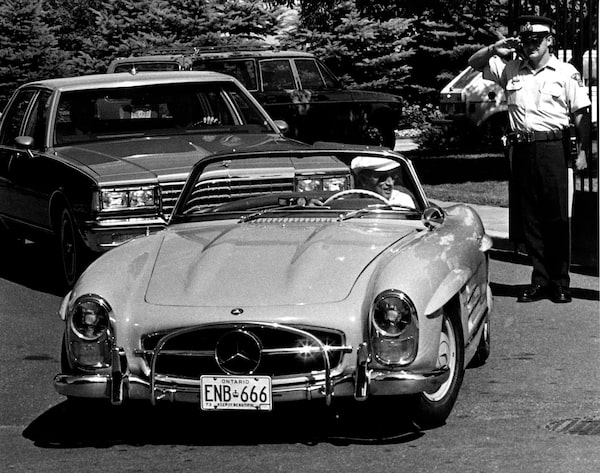
Former Prime Minister Pierre Trudeau gets a final slaute from RCMP guard as he leaves 24 Sussex Dr. June 30, 1984 after resigning as prime minister.The Canadian Press
Parliament wasn’t sitting and it was quiet at the start of the last week of February in 1984. Pierre Trudeau, who was 65, had been in power for 16 years. Less than a year remained in his government’s mandate and everyone awaited his decision on his future.
The country was wracked by a recession worse than in the other G7 countries. Unemployment, at 12 per cent, was way higher than today – as was inflation, as was the deficit. Instead of focusing on the economy, Pierre Trudeau had been fixated on an issue most Canadians didn’t care much about – the Constitution.
Though conditions were worse than today, the northern magus, as Richard Gwyn described him, didn’t face the level of vitriol his son Justin Trudeau does today. For one thing, there was no internet back then dispensing online rage. For another, opposition leader Brian Mulroney did not traffic in insults like the bloodhound who is today’s Conservative leader.
Despite being way down in opinion polls, Pierre Trudeau, like his son, kept resisting calls to step down. David Collenette, who served in his cabinet, recalled a caucus meeting in 1983 when as many as 13 Liberal members called for his resignation “to his face.” The news of it never got out.
But finally, on Feb. 28, when the party was up against the wall in terms of election timing, Mr. Trudeau took his much-celebrated walk in the snow – a foot and a half of it. He’d taken one of his boys to judo class, returned, and went out into the blizzard. He vainly looked, as he recalled, for signs of destiny in the stars.
He returned home and sat in a sauna for an hour and a half. He went to his office the next morning, a rose in his lapel as always, and wrote a note to party president Iona Campagnolo saying he was resigning as party leader and prime minister.
It was what most in the party wanted, but he had waited too long in the hope that public opinion would change. It didn’t change and his successor, John Turner, was left with no time to make a mark. He ran a dreadful election campaign in which the Liberals were demolished by the Mulroney Tories.
Mr. Trudeau’s son, Alexandre, as reported in John English’s Trudeau biography, Just Watch Me, believed that “part of his father had died” with that walk in the snow, because never again could he find the challenges he craved and the energy to face them.
But Brian Mulroney would be the first to attest that this was not the case. Pierre Trudeau couldn’t, like other PMs, go quietly. His vociferous attacks against Mr. Mulroney’s Meech Lake and Charlottetown Accords were highly instrumental in their rejection.
In so doing, Mr. Trudeau embellished his reputation as a divider. He’d alienated the West with the National Energy Program and caustic putdowns. He’d brought in the new Constitution without Quebec’s signature. He’d left relations with Washington in disrepair and he’d left his own Liberal Party, which he’d led to so many victories, fractious. It would soon bitterly divide into John Turner and Jean Chrétien factions.
Mr. Trudeau was far more than a disrupter, however. The paradox was that if he left the country divided, he also left it – and it’s a reason he’s always ranked among the most favoured PMs – strengthened. With his intellectual rigour, counterculture panache and gunslinger grit, he gave Canada backbone.
The divider was a liberator, unfastening the country from old men, old thinking, narrow traditions and colonial caution. His patriation of the Constitution lessened our dependence on Great Britain and its authority. With his bilingualism and multicultural policies he liberated the country from its unicultural trappings. With ice in his veins, he stared down terrorists and separatists.
On that night of the blizzard, this legacy, this sense of lasting achievement, no doubt made his decision to leave easier.
His overly woke-ish son has surely ruminated about his father’s walk in the snow and whether his decision that night was the wisest one. While Justin has no singular achievement like his father, like him he has a winning political record, substantive social policy achievements for progressives, and public opinion urging him to leave.
If Pierre Trudeau was still around, he’d likely praise his son for his fight and his accomplishments. And if there was a snowstorm in the nation’s capital, he’d probably suggest he go for a walk like the one he took himself 40 years ago.
 Lawrence Martin
Lawrence Martin